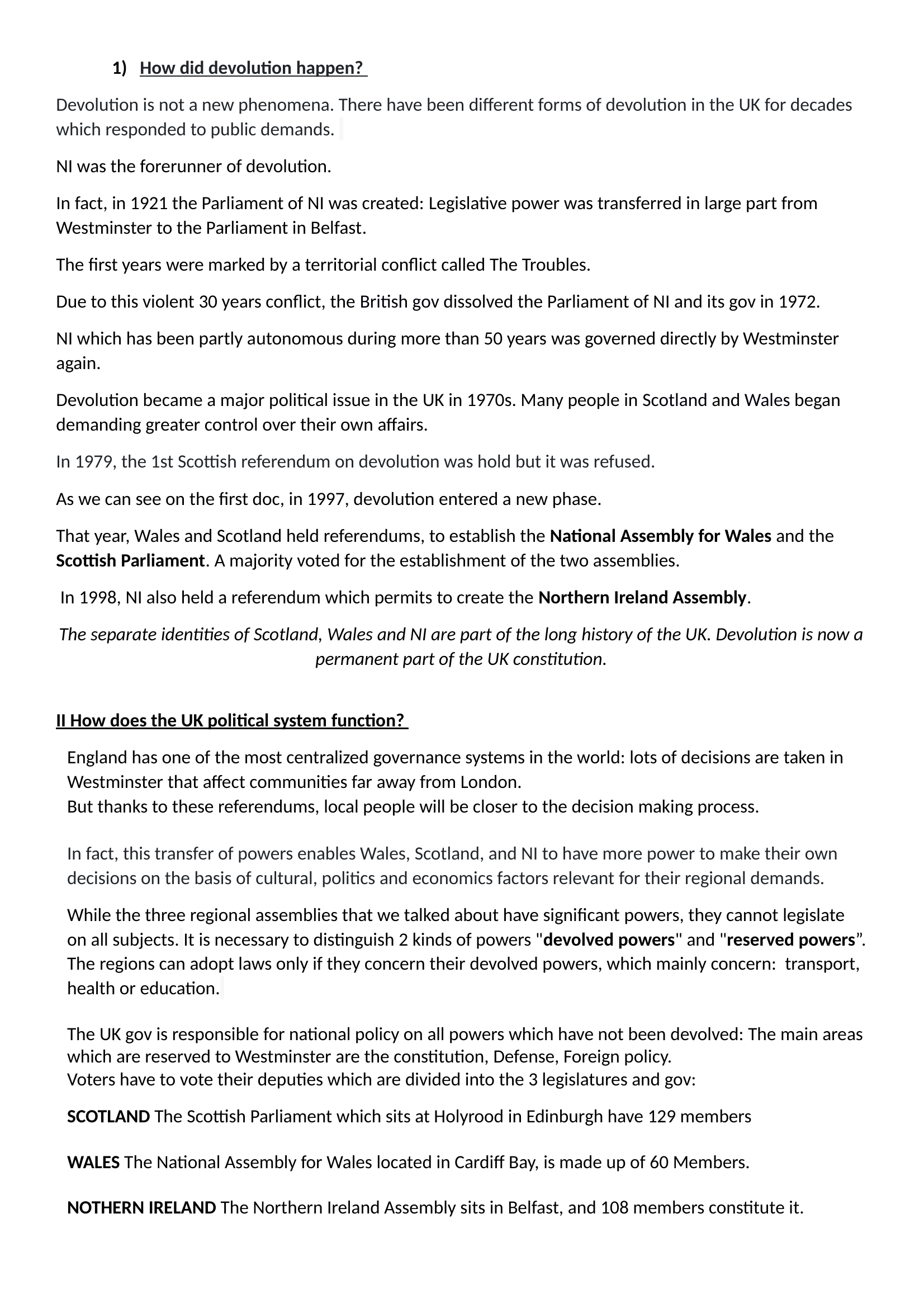Devolution in the UK
Publié le 05/11/2020

Extrait du document
«
1) How did devolution happen?
Devolution is not a new phenomena.
There have been different forms of devolution in the UK for decades
which responded to public demands.
NI was the forerunner of devolution.
In fact, in 1921 the Parliament of NI was created: Legislative power was transferred in large part from
Westminster to the Parliament in Belfast .
The first years were marked by a territorial conflict called The Troubles.
Due to this violent 30 years conflict, the British gov dissolved the Parliament of NI and its gov in 1972.
NI which has been partly a utonomous during more than 50 years was governed directly by Westminster
again.
Devolution became a major political issue in the UK in 1970s.
Many people in Scotland and Wales began
demanding greater control over their own affairs.
In 1979, the 1st Scottish referendum on devolution was hold but it was refused.
As we can see on the first doc, in 1997, devolution entered a new phase.
That year, Wales and Scotland held referendums, to establish the National Assembly for Wales and the
Scottish Parliament .
A majority voted for the establishment of the two assemblies.
In 1998, NI also held a referendum which permits to create the Northern Ireland Assembly .
The separate identities of Scotland, Wales and NI are part of the long history of the UK.
Devolution is now a
permanent part of the UK constitution.
II How does the UK political system function?
England has one of the most centralized governance systems in the world: lots of decisions are taken in
Westminster that affect communities far away from London.
But thanks to these referendums, local people will be closer to the decision making process.
In fact, this transfer of powers enables Wales, Scotland, and NI to have more power to make their own
decisions on the basis of cultural, politics and economics factors relevant for their regional demands.
While the three regional assemblies that we talked about have significant powers, they cannot legislate
on all subjects.
It is necessary to distinguish 2 kinds of powers " devolved powers " and " reserved powers ”.
The regions can adopt laws only if they concern their devolved powers, which mainly concern: transport,
health or education.
The UK gov is responsible for national policy on all powers which have not been devolved: The main areas
which are reserved to Westminster are the constitution, Defense, Foreign policy.
Voters have to vote their deputies which are divided into the 3 legislatures and gov:
SCOTLAND The Scottish Parliament which sits at Holyrood in Edinburgh have 129 members
WALES The National Assembly for Wales located in Cardiff Bay, is made up of 60 Members.
NOTHERN IRELAND The Northern Ireland Assembly sits in Belfast, and 108 members constitute it..
»
↓↓↓ APERÇU DU DOCUMENT ↓↓↓
Liens utiles
- exposé anglais introduction to the Consumer Society
- Le théâtre a-t-il pour fonction de tout dire, de tout expliquer au spectateur de la crise que vivent les personnages? - Par quels moyens et quelles fonctions Juste la Fin du monde est une pièce qui nous retrace la crise de cette famille?
- Ideology and Rationality in the History of the Life Sciences
- is the cultural difference a barrier between individuals.
- Subject: What are the impacts of racism on black people in the United States





